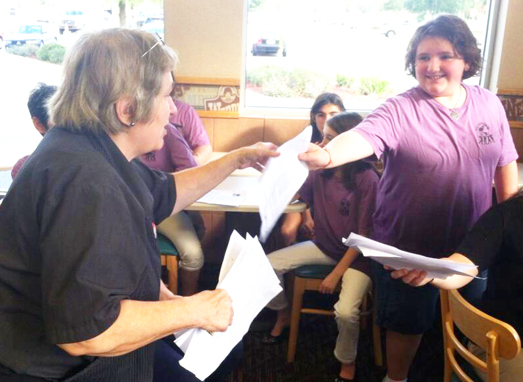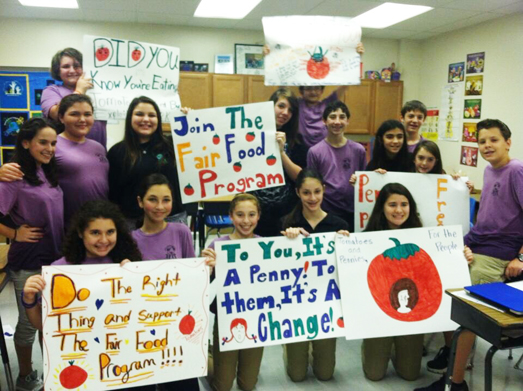[hupso_hide][hupso title=”.@Truah leaders take letter to key @Wendys shareholder PUBLIC for Intl #HumanRights Day!” url=”https://ciw-online.org/?p=17536″]
Rabbinic letter to key Wendy’s shareholder taken public after private efforts go without response; Rabbis lead Wendy’s delegations in 15 cities…
On December 10th, 1950, the United Nations proclaimed the first ever International Human Rights Day, a day to draw the attention of the world to the Universal Declaration of Human Rights as the standard for social and economic justice toward which all nations, and all peoples, should strive. Set out in that hallowed declaration are many essential labor rights, including the right “to not be held in slavery or servitude” (Article 4), “to just and favorable conditions of work” (Article 23.1) and “to just and favourable remuneration ensuring… an existence worthy of human dignity” (Article 23.3). These fundamental human rights form the basis of a just, modern society envisioned by a world still reeling from World War II and the Holocaust and seeking a future of political and economic stability founded on justice.
They also form the basis of the Fair Food Program and the campaign launched by workers in Immokalee twenty years ago for a more modern, more humane agricultural industry. And this past Tuesday, December 10th, some of the Fair Food Nation’s most passionate faith leaders took to the streets again to proclaim their own commitment to human rights in Florida’s fields with actions at more than a dozen Wendy’s restaurants across the country!
From silence, protest
First, the backstory.
In early fall, T’ruah — the national rabbinical organization and longtime CIW ally dedicated to the Jewish imperative to respect and protect the human rights of all people — began to reach out to Nelson Peltz, a leading member of Wendy’s Board of Directors and a prominent business leader in the Jewish community who, as it happens, has been honored by the Jewish Labor Committee for his support for workers’ rights and economic justice. After several attempts to reach Mr. Peltz privately about the merits of the Fair Food Program, 36 of the rabbis who had witnessed the CIW’s work first-hand in Immokalee drafted a private letter, urging him to meet with the Coalition. The rabbis decided that if Mr. Peltz didn’t respond by International Human Rights Day — December 10th — T’ruah would have no choice but to take their message to the public.
Here is a brief excerpt from their powerful missive to Mr. Peltz (you can find letter in full here):
Dear Mr. Peltz,
We, the thirty-six rabbis named below, are writing to invite you to meet with the Coalition of Immokalee Workers (CIW) to learn how Wendy’s can join other leaders of the fast food industry in creating safe and fair conditions for workers in the Florida tomato industry by joining the Fair Food Program (FFP).
All of us have traveled to Immokalee, FL, where we have seen firsthand the tangible difference the Fair Food Program makes in the lives of the people who pick the food each of us eat every day. We’ve witnessed the powerful partnerships between workers, growers and corporations, whose collaboration is transforming an industry once mired in slavery to one now founded on dignity and respect. Back in our own communities, we have heard from our congregants and students how important it is to them that the tomatoes they eat are picked by people who are not at danger for slavery, sexual assault, wage theft, violence, or other forms of exploitation.
Wendy’s is a large buyer of Florida tomatoes. Given its market power, Wendy’s participation in the Fair Food Program is not an option but a moral obligation. Of the five largest fast food corporations in the country — McDonald’s, Subway, Burger King, Taco Bell (Yum! Brands), and Wendy’s — Wendy’s is the only one not participating in the Fair Food Program. […]
[…] As Jews and religious leaders, we believe that our faith calls on us to work for justice. The Torah insists that every human being is a creation in the image of God, who therefore deserves to be treated with dignity and honor. The Jewish laws governing relationships between employers and workers mandate paying a fair wage and protecting workers from danger. And our collective narrative of slavery and liberation obligates us to end slavery in our own time.
We ask you to sit down with the CIW to learn more about the Fair Food Program. If Wendy’s hopes to continue modernizing its image, it must first leave behind the old fashioned way of doing business that allows for slavery and other forms of exploitation.
True to their word, the rabbis waited nearly three months for a response from Mr. Peltz, but when none was forthcoming — not even the common courtesy of a formal “No” — they made the letter public. But they didn’t stop there! T’ruah also hit the streets for Human Rights Shabbat, a long-standing tradition for December’s International Human Rights Day, with rabbis in 15 cities rallying their congregations and heading to Wendy’s stores.
One of the most inspiring actions, to be sure, was in Jacksonville, FL, where Rabbi Jesse Olitzky led a band of local Middle School students in a delegation to Wendy’s — with great success, we might add. Here, in Rabbi Olitzky’s own words, is a quick report on this inspiring action:
The manager of the restaurant was aware that we were coming and was happy to meet with us and hear our students express their concerns about the exploitation of workers in Florida tomato fields. After explaining to the manager the need for Wendy’s to join the Fair Food Program, our students handed her signed letters from T’ruah, urging her to pass the letters along to her bosses and the corporate office. Our voices were heard and she assured us that she would speak to the corporate office and share our concerns.
“The manager was also aware that we would be participating in such an action outside the store and welcomed it, emphasizing our right to educate and our freedom of speech and expression. As cars and individuals passed by, we made them aware of the Fair Food Program and the need for Wendy’s to join! Our students felt inspired. As a rabbi, I was even more inspired, watching them take action, prepared to fight for the rights – for the Human Rights – of other individuals. This is a cause that may not have directly affected them, but it very much did because they understood that we are each made in God’s image so our lives are all sacred and interconnected. This was just one afternoon and one action, but it was an afternoon that inspired me, as I know believe that these Middle School students – these future leaders of the Jewish community – will continue to not just learn of our tradition, but also live the ethics and values of our tradition and ensure equality and Human Rights for all.”
— Rabbi Jesse Olitzky, Jacksonville Jewish Center
Jacksonville even included some live tweets from the action (see below)!
Talking Points as our Middle School students make change & take action at Wendy’s @ciw@truahrabbispic.twitter.com/URPYRPesG5
— Jesse Olitzky (@JMOlitzky) December 6, 2013
Taking Action at Wendy’s encouraging them to join @ciw Fair Food Program @truahrabbis #HumanRightsShabbat pic.twitter.com/GrR84IBwis
— Jesse Olitzky (@JMOlitzky) December 6, 2013
But, Jacksonville didn’t have all the fun. Conscientious consumers took their demand for respect for farmworkers’ basic human rights to Wendy’s restaurants in all corners of the country. Here are just some of the shining faces from the Human Rights Shabbat delegations:
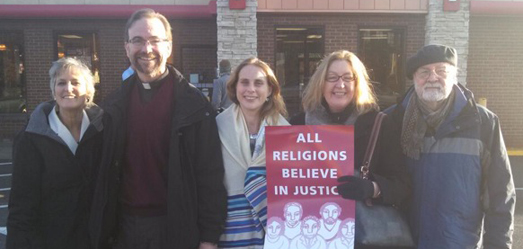

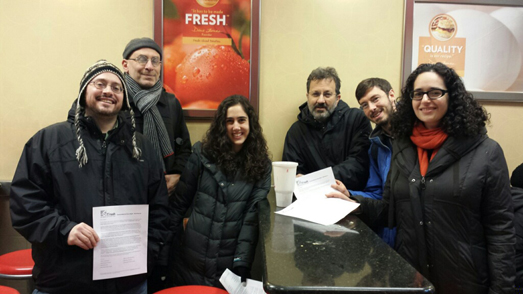

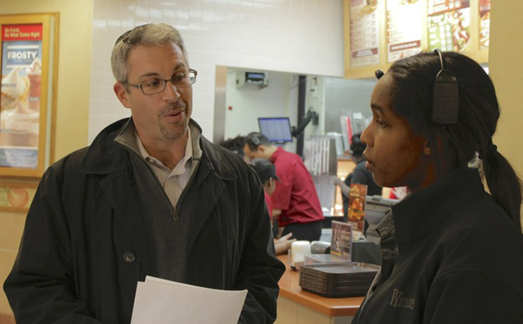
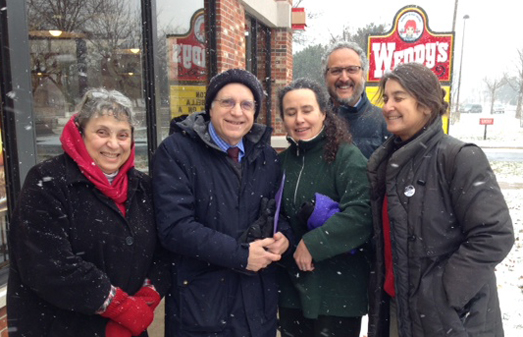
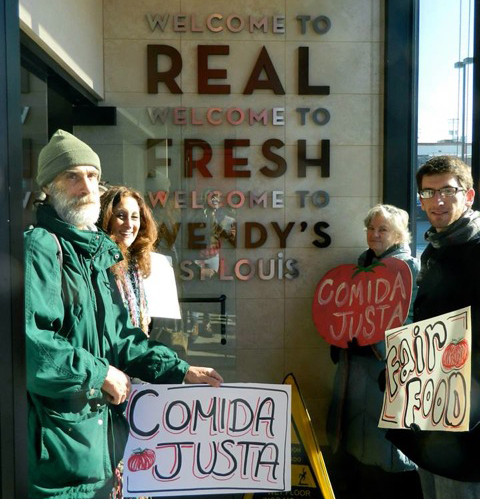
And so the invitation for Wendy’s to join the Fair Food Program — a program that is today bringing about real, measurable change in the lives of tens of thousands of farmworkers in the fields where Wendy’s buys its tomatoes, a concrete, working manifestation of the vision for a more just world encoded in Universal Declaration of Human Rights — is once again on the table. We sincerely hope that Mr. Peltz, and his fellow leaders in Wendy’s, will take to this invitation to heart.
Whether he and the rest of Wendy’s leadership realize it or not, there really is no other way. In the 21st century, full and active respect for human rights in corporate supply chains is inescapably becoming the norm. And consumers — in particular the young consumers that represent the future of the fast-food market — are increasingly demanding transparency and human rights in the products they buy and the food they eat, and that growing trend will not be turned around.
Wendy’s leaders can stick their heads in the sand and hope the Fair Food movement goes away. But when they pull their heads back out and look around, they’ll only see an even larger crowd of informed, active consumers demanding that Wendy’s join the rest of the fast-food industry in supporting real rights for farmworkers. The choice is theirs, but consumers clearly have their own timetable, and the time for change is now.


